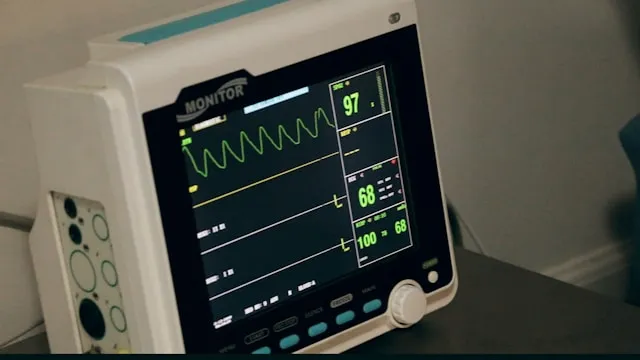The heart is one of the most crucial organs of the human body. A minor issue not only affects your heart but also other organs. This is because the heart is the organ that sends oxygen to all other organs of the body to ensure they function efficiently. Hence, it is important for your heart to be healthy for the overall health of your body.
To diagnose your heart's condition, the best heart hospital in India provides you with a number of medical tests. It is advisable to get your blood samples checked at least half-yearly and get ECG done yearly when you are over the age of 30. You can increase the frequency of these tests when you age even further.
 For conducting a blood test, a laboratory technician takes a blood sample from a vein in your arm. This blood then goes for testing into the lab for the following things.
For conducting a blood test, a laboratory technician takes a blood sample from a vein in your arm. This blood then goes for testing into the lab for the following things.
 A non-invasive test is a medical test in which no equipment enters your body to conduct the heart test. The non-invasive heart diagnosis tests are as given below.
A non-invasive test is a medical test in which no equipment enters your body to conduct the heart test. The non-invasive heart diagnosis tests are as given below.
 These tests are the last resort for doctors when they fail to diagnose any issue with the help of blood tests and non-invasive tests. In these tests, certain tools or chemicals are inserted into your body to get the actual picture and diagnosis of your heart condition. Although some of these tests may have severe financial implications, still, for a safe experience, it is good to conduct these tests only at the best heart hospitals in India.
These tests are the last resort for doctors when they fail to diagnose any issue with the help of blood tests and non-invasive tests. In these tests, certain tools or chemicals are inserted into your body to get the actual picture and diagnosis of your heart condition. Although some of these tests may have severe financial implications, still, for a safe experience, it is good to conduct these tests only at the best heart hospitals in India.
Medical Tests For Heart Disease
The medical tests for heart disease diagnosis can be categorized into three categories.1. Blood Tests
 For conducting a blood test, a laboratory technician takes a blood sample from a vein in your arm. This blood then goes for testing into the lab for the following things.
For conducting a blood test, a laboratory technician takes a blood sample from a vein in your arm. This blood then goes for testing into the lab for the following things.
- Cholesterol and Triglycerides - Cholesterol and fats deposited on the inner lining of your blood vessels can cause blockages in blood flow and even a heart attack. A blood test can detect the increased or decreased levels of these fats and indicate if they are on dangerous points.
- Vitamins and Minerals - An increased or decreased level of certain chemicals like potassium or calcium in your body might affect your heart rate, and thus, the oxygen supply to your body. Through a blood test, your doctor can understand if there are any imbalances in your body.
- Thyroid - Hypothyroidism or hyperthyroidism is another thing that can play with your heart rate and can be measured through the blood.
- Muscle Damage - If any of your heart muscles get damaged due to an injury or a heart attack, your body releases certain substances in your blood. A blood test can bring out these signs in front of your doctor, who can then treat these symptoms appropriately. Always ensure that you're visiting the best heart hospitals in India as they can provide you with high-quality service for a better tomorrow.
2. Non-invasive Tests
 A non-invasive test is a medical test in which no equipment enters your body to conduct the heart test. The non-invasive heart diagnosis tests are as given below.
A non-invasive test is a medical test in which no equipment enters your body to conduct the heart test. The non-invasive heart diagnosis tests are as given below.
- Electrocardiogram (ECG) - It is the most common type of medical test related to the heart. Some electrodes are attached to the skin around your heart and legs to record the electrical activity of your heart. As a result, your heartbeats are recorded and printed on paper for the doctor to read them. Any shift from the normal heartbeat pattern needs to be considered and treated by the doctor.
- Echocardiogram - This test is similar to an ultrasound test conducted on an expecting mother during pregnancy. The resultant of an echocardiogram is a video image of the heart. The ultrasound waves of an echocardiogram measure the health and functioning of the heart muscles, valves, and chambers.
- Stress Test - It is basically an ECG done when you are under stress. Also known as a treadmill test, you are made to walk or run on a treadmill while the test records the capability and response of your heart under physical exertion.
- Heart MRI - Radio waves take the image of your heart and its surrounding areas like the lungs and the blood vessels. The doctor is then able to diagnose the condition of your heart muscles or plaque buildup in and around the heart.
3. Invasive Diagnostic Tests
 These tests are the last resort for doctors when they fail to diagnose any issue with the help of blood tests and non-invasive tests. In these tests, certain tools or chemicals are inserted into your body to get the actual picture and diagnosis of your heart condition. Although some of these tests may have severe financial implications, still, for a safe experience, it is good to conduct these tests only at the best heart hospitals in India.
These tests are the last resort for doctors when they fail to diagnose any issue with the help of blood tests and non-invasive tests. In these tests, certain tools or chemicals are inserted into your body to get the actual picture and diagnosis of your heart condition. Although some of these tests may have severe financial implications, still, for a safe experience, it is good to conduct these tests only at the best heart hospitals in India.
- Electrophysiology Study - An electrode catheter is inserted into one of your blood vessels. This electrode sends electrical signals to your heart to record cardiac activity and measure abnormalities in the heart rhythms.
- Coronary Angiography - A contrast dye is injected into the body through a flexible tube-like instrument that is inserted into the vein. This test shows the flow of blood in the arteries and produces images of the heart and coronary arteries. Read all about Coronary Angiography
- Nuclear Cardiac Stress Test - Thallium, a radioactive substance, is injected into the body that goes to the heart and releases energy. Some cameras are used to take pictures of this energy from outside the body. This test is done when you are at rest as well as under stress. The doctor understands how blood flows through your heart and how your heart pumps it when at rest or under exertion.

Reviewed by







